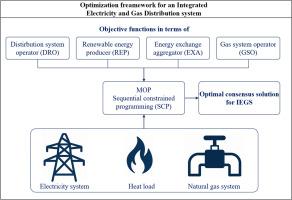Sequential constrained optimization for multi-entity operation of integrated electricity-gas distribution systems
IF 9.6
Q1 COMPUTER SCIENCE, ARTIFICIAL INTELLIGENCE
引用次数: 0
Abstract
The reliable and coordinated operation of energy systems is becoming increasingly important as renewable energy penetration grows and electricity and gas infrastructures become more interconnected. This study addresses the challenge of aligning multiple stakeholders’ objectives in integrated electricity and gas distribution systems by proposing a sequential constrained optimization method. The method solves the multi-objective optimization problem by sequentially prioritizing each entity’s objective while incorporating others as adaptive-weighted sub-objectives and constraints. This process ensures that all entities participate in a fair and balanced decision-making procedure, ultimately converging to a consensus-based solution. The algorithm is validated using IEEE 33-bus and 118-bus test systems coupled with gas networks. Results show that the proposed method improves optimal resource allocation effectiveness by up to 3.66 compared to individual-objective or aggregated-objective benchmarks. Specifically, the method achieves performance improvements ranging from 0.02 pu to 1.7 pu across four distinct entities, highlighting its superiority in balancing conflicting operational goals. Moreover, the method demonstrates low computational delay and converges in fewer than 15 iterations for all tested cases. The algorithm adapts flexibly to different system configurations and maintains solution stability even under asymmetric stakeholder preferences. These findings indicate that the proposed sequential constrained optimization framework is a scalable and effective approach for equitable, multi-agent coordination in integrated multi-energy systems.

电-气一体化系统多实体运行的序贯约束优化
随着可再生能源普及率的提高以及电力和天然气基础设施的相互联系日益紧密,能源系统的可靠和协调运行变得越来越重要。本研究通过提出一种顺序约束优化方法,解决了在综合电力和天然气分配系统中协调多个利益相关者目标的挑战。该方法通过对每个实体的目标进行排序,同时将其他实体的目标作为自适应加权子目标和约束,解决了多目标优化问题。这一进程确保所有实体参与公平和平衡的决策程序,最终达成基于协商一致的解决办法。采用IEEE 33总线和118总线测试系统,结合燃气网络对算法进行了验证。结果表明,与个体目标基准和聚合目标基准相比,所提方法的最优资源分配效率提高了3.66。具体来说,该方法在四个不同的实体上实现了从0.02到1.7 pu的性能改进,突出了其在平衡冲突的操作目标方面的优势。此外,该方法具有较低的计算延迟,并且在所有测试用例的15次迭代以内收敛。该算法能够灵活适应不同的系统配置,即使在利益相关者偏好不对称的情况下也能保持解的稳定性。这些结果表明,所提出的顺序约束优化框架是一种可扩展且有效的方法,可用于集成多能系统中公平的多智能体协调。
本文章由计算机程序翻译,如有差异,请以英文原文为准。
求助全文
约1分钟内获得全文
求助全文
来源期刊

Energy and AI
Engineering-Engineering (miscellaneous)
CiteScore
16.50
自引率
0.00%
发文量
64
审稿时长
56 days
 求助内容:
求助内容: 应助结果提醒方式:
应助结果提醒方式:


